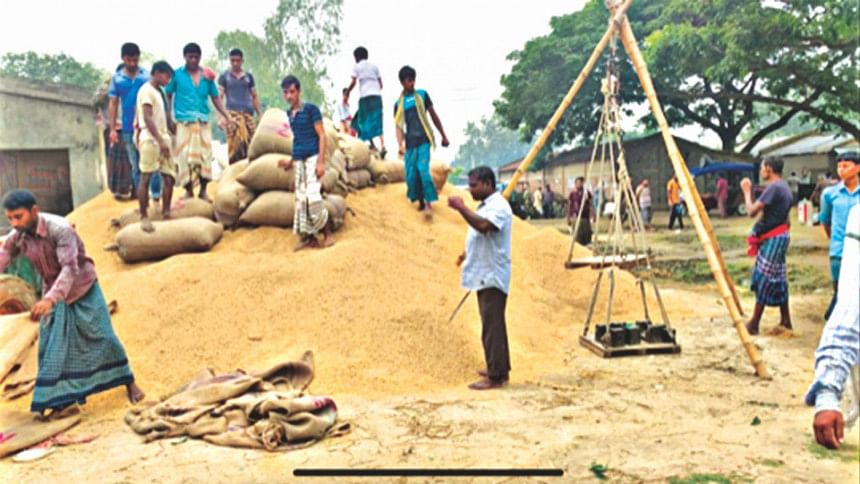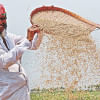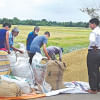Eid won’t bring any joy to them

A little over a week is left before the Eid-ul-Fitr but that can hardly excite the paddy growers in Naogaon as they remain preoccupied with falling prices and debts.
The government initiative to buy rice from farmers has made barely any impact on local markets and the prices have continued to drop over the last one week.
“The government is buying 1.5 lakh tonnes of rice from across the country while the farmers have produced 1.68 lakh tonnes in Mahadebpur upazila alone,” said a district agriculture officer on condition of anonymity.
“So, you can see how insignificant the quantity is. The initiative does not have any impact on the ground,” he said.
The price of fine rice was Tk 720 a maund just one week ago but it came down to Tk 600 to Tk 620 on Friday. Even many farmers had to sell their produce at Tk 500 if the quality of rice was not good.
In different parts of Naogaon, small farmers were found worried about how they would repay their debt to fertiliser and pesticide traders.
Mainul Mia from Bilkuri village came to Chhatontoli paddy market on Friday morning with nine maunds of paddy. But he was very upset as the wholesalers were not offering him more than Tk 600 a maund.
“It cost me more than Tk 900 to grow one maund of rice. But they are offering me only Tk 600.”
But farmers are bound to sell their crops at such a low price as they have to repay their debt, said the sharecropper.
“I spent Tk 8,000 to cultivate rice in one bigha of land. But now it is getting difficult to get even Tk 6,000 by selling rice. Our situation is so bad we would not survive if the government does not do anything for us.”
Mainul, a father of three, thought he would buy new clothes for his children after selling his crops. But the situation is so dire now that they can barely afford to eat after repaying his debt.
“Only Allah knows how we would celebrate Eid. Our main challenge now is to survive in the coming months.”
Azhar Mia, another sharecropper from Debipur village, spent Tk 34,000 to grow rice on five bighas of land. Although he harvested 105 maunds of rice, he had to give away 62 maunds to the land owner and as wages for the day labourers.
He was able to sell 10 maunds of rice at Tk 620 a maund on Friday at Chhatintoli market. “Forget about profits. I cannot even recover my production cost.”
He had to sell off his produce though the prices were low as he was left with no choice but to repay his loans. Many farmers were seen taking their rice back, disheartened by the low prices.
Bachchu Mia, a wholesaler from Chhatantali paddy market, said prices were falling every day as mill owners were not buying from them.
“Mill owners are not offering better prices either. Yesterday [on Friday], I bought paddy at Tk 640 a maund. But mill owners are offering only Tk 620. So today, I am not interested in buying a maund at more than Tk 600,” he said.
“We know that farmers are facing losses. But we have to do business and it is the same for us. We cannot buy more rice if we don’t get higher prices in return,” explained Bachchu.
Saidur Rahman, manager at Sumaiya traders, one of the biggest wholesalers of Mahadebpur upazila, said they are in a fix as they are buying from farmers but are unable to sell to the mill owners.
On such low prices, Nirod Boron Saha Chandan, president of Paddy and Rice Wholesaler and Traders Association, said prices will not go up unless mill owners buy rice.
In addition, there is plenty of rice available in the market at the moment as 39 lakh tonnes of rice was imported last year.
“The mill owners also bought huge quantities of Aman rice last year, so their stocks are full. Most mill owners do not have money to buy Boro from the farmers at the moment either,” said Chandan.
The situation will improve if the government buys Aman rice from the mill owners and provides them with bank loans, he added.
“I do not see any other option to ease farmers’ sufferings.”


 For all latest news, follow The Daily Star's Google News channel.
For all latest news, follow The Daily Star's Google News channel. 







Comments